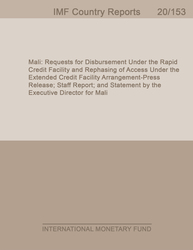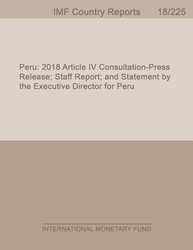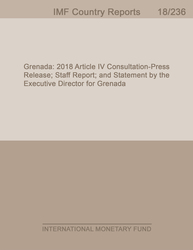
Mali:Requests for Disbursement Under the Rapid Credit Facility and Rephasing of Access Under the Extended Credit Facility Arrangement-Press Release; Staff Report; and Statement by the Executive Director for Mali
Requests for Disbursement Under the Rapid Credit Facility and Rephasing of Access Under the Extended Credit Facility Arrangement-Press Release; Staff Report; and Statement by the Executive Director for Mali
READ MORE...
Volume/Issue:
Volume 2020
Issue 153
Publication date: May 2020
ISBN: 9781513543079
$18.00
Add to Cart by clicking price of the language and format you'd like to purchase
Available Languages and Formats
| English | |||
| French |
Prices in red indicate formats that are not yet available but are forthcoming.
Topics covered in this book
This title contains information about the following subjects.
Click on a subject if you would like to see other titles with the same subjects.
Exports and Imports , Finance , Money and Monetary Policy , Public Finance , ISCR , CR , financing , emergency financing request , financing needs , IMF lending tracker , financing gap , RCF disbursement , Stress testing , Credit , Debt service , West Africa , Global , COVID-19
Also of interest
Summary
This paper discusses Requests for Disbursement Under the Rapid Credit Facility (RCF) and Rephasing of Access Under the Extended Credit Facility (ECF) Arrangement. The coronavirus disease 2019 (COVID-19) shock hit the economy hard amid an already challenging social and security situation. The decline in economic activity, spillovers from global trade and financing shocks, along with fiscal measures to combat the crisis have created an urgent balance-of-payments and fiscal financing needs. The authorities have responded quickly to the pandemic with containment measures, stepped up healthcare response, and emergency measures to support households and business affected by the outbreak. The regional central bank responded with measures to support liquidity in the banking system. Given the urgent balance of payment need caused by the COVID-19 pandemic and the infeasibility of completing a review under the ECF arrangement, staff supports these requests and welcomes commitments to safeguard transparency and accountability in the use of emergency funds. The RCF is expected to cover about 40 percent of the financing gap in 2020 and is expected to play a catalytic role. The authorities are actively engaged with other donors, including the World Bank, to cover the remaining financing needs.
Copyright © 2010 - 2026
Powered by:
AIDC



